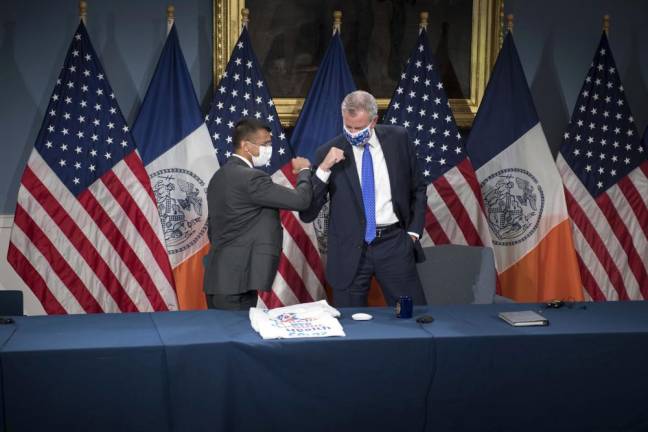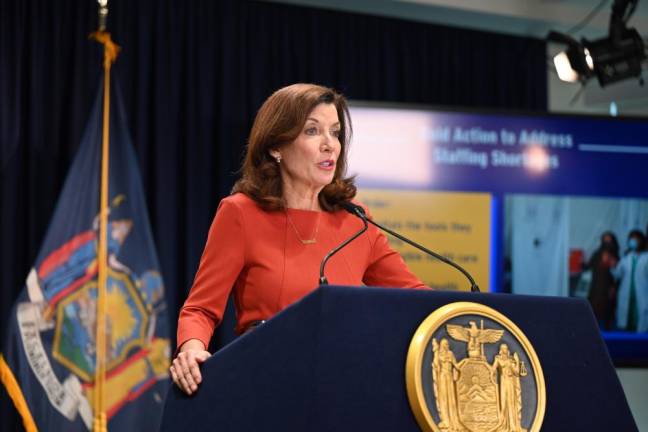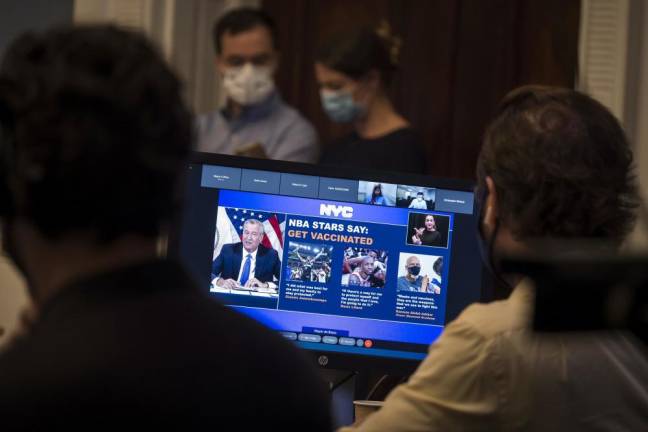Vaccine mandates work, the mayor says. So why isn’t vaccination against COVID-19 mandated for more New Yorkers?
That question dogged the mayor and his team as vaccine mandates went into effect for two large groups of workers: in the city public schools, imposed by Mayor Bill de Blasio, and at hospitals and health care facilities, as ordered by Governor Kathy Hochul.
In both cases, the mandates seemed to be working to increase vaccination rates among the covered workers, and fewer of those workers than feared had to be fired or suspended for refusing.
“Mandates work,” de Blasio said Friday as his mandate that all school employees be vaccinated was about to go into effect.
“As of this morning, 90 percent of our Department of Education employees are vaccinated, at least one dose, 93 percent of our teachers, 98 percent of our principals,” the mayor said. “The bottom line is this mandate has worked and the goal was to protect kids, including our youngest kids who can’t be vaccinated yet, and to ensure that families knew schools would be safe.”
Those numbers are a swift improvement over recent days and eased fears that the city won’t be able to substitute for staff who refuse to be vaccinated and are suspended from work beginning Monday.
As schools opened Monday without apparent serious staffing disruptions, the big challenge now seems to be explaining why teachers are required to be vaccinated and not cops, firefighters, sanitation workers or others who interact with the public regularly.
The question was being pressed by both officials who appear to believe the city should go further, including the speaker of the City Council, as well as by a group of teachers who sued saying the city was treating them unfairly by forcing them and not others to be vaccinated.
Patchwork of Mandates
Indeed, New Yorkers find themselves under a baffling patchwork of mandates. Contradictions abound:
*Teachers and staff in city schools must be vaccinated as of Friday evening, but not students. At the City University, the precise opposite is the rule. Students must be vaccinated, but not faculty and staff.
*Staff at child care centers for young children must be vaccinated if the center is directly contracted by the city, but not if it is independent.
*School Safety Agents, part of the Police Department (until next summer), are required to be vaccinated, but the rest of the NYPD is not.
*The mandatory vaccine line runs right through the city agency principally responsible for the city’s pandemic response, the Department of Health and Mental Hygiene. Heath Department staff who work in clinics serving patients with tuberculosis or sexually transmitted diseases must be vaccinated, under the governor’s order. But for the rest, vaccination is encouraged.
*And, of course, everyone who works or wants to eat indoors at a restaurant must be vaccinated.
*If it is all too confusing, you could fly out of town on United Airlines, where your crew must be fully vaccinated. Not so for crews on Delta. But unvaccinated Delta staff do pay more for their health insurance, if that makes you more comfortable.
The issue is urgent enough that City Council Speaker Corey Johnson appeared personally at a joint hearing of the Council’s Health and Hospital committees to press city officials.
“The city’s workforce itself is seeing massive differences in vaccination rates,” Johnson said. “Overall only 65 percent of city workers had received at least one dose of the vaccine.” That is substantially less than the 82 percent of all adult New Yorkers who have received at least one dose, according to Health Department records.
“Ninety-two percent of the staff at the Conflict of Interest Board are vaccinated,” Johnson continued. “But for the Department of Sanitation the rate is only 44 percent. The rates for first responders are particularly concerning. Just 57 percent of the FDNY is vaccinated and only 53 percent of the NYPD is vaccinated. Getting these numbers up might be the most important task we have as a city. Our economy and the health and safety of New Yorkers depends on it.”
De Blasio and his health commissioner, Dr. Dave Chokshi, walked a tightrope as they sought to explain why some New Yorkers were mandated to get vaccine and others not.
Speaker Johnson pressed Chokshi at the hearing Thursday.
Johnson: “Would you support a full vaccine mandate, no testing option, for the entire city workforce?”
Chokshi: “I do support vaccine requirement where they are warranted. We have been very supportive as the mayor has said of climbing the ladder it is important to make sure that we do this in a methodical and staged way, to bring people along to make sure people do get their questions answered.”
“And so I was a strong supporter of the vaccination or testing mandate that we have rolled out (for city workers).We have to continue to watch the situation as it evolves. And it may be the case that a full vaccine mandate is warranted in the future. But right now I would say that I support the vaccination or testing mandate and moving toward full vaccine mandates in specific segment as we have seen for health care workers and for department of education staff.”
Johnson: “What about for first responders? Should there be a full vaccine mandate without a testing option for first responders?”
Chokshi: “I want to get as many first responders fully vaccinated as quickly as possible. I think there is great work that is already ongoing to raise those rates and we will have to see if that is another area where climbing the ladder is necessary to get the rates as high as they can possibly go.”
Opposite Directions
At the hearing, two factors emerged that seemed to push in opposite directions in terms of mandating vaccination.
On the one hand, the Delta variant has meant, Chokshi explained, that he cannot set a precise proportion of the population that must be vaccinated to create so called “herd immunity.” The only course, therefore, is to push vaccination as high as possible, he said.
At the same time, there are still substantial numbers of people who are hesitant to receive the vaccine. Chokshi has actually flipped the language the city uses to describe the goal as increasing confidence in vaccines, not as overcoming hesitancy.
A number of health experts have worried that pushing reluctant people too hard too fast into being vaccinated could backfire and heighten resistance. Indeed, small examples of that emerged at the hearing.
The city has said it tried every voluntary measure it could think of to increase uptake of the vaccine, from sports tickets to $100 payments, before resorting to mandatory vaccination in some situations.
“This assertion is gallingly untrue,” testified Allie Bohm, a policy counsel for the New York Civil Liberties Union.
De Blasio and Chokshi said the city was continuing its efforts to reach out to people and communities that had been slow to accept the vaccines. Chokshi described how in his own department clinicians who had worked with COVID-19 patients held discussions with hesitant staff.
Salvena Brooks-Powers, who represents Far Rockaway and other parts of south Queens in the Council, complained at the hearing that for all the city’s talk of outreach, she had had a very hard time arranging visits of the mobile vaccination vans with enough notice to alert churches and other community groups.
The city promised to keep trying.
Teachers and staff in city schools must be vaccinated as of Friday evening, but not students. At the City University, the precise opposite is the rule. Students must be vaccinated, but not faculty and staff.


